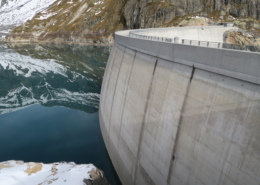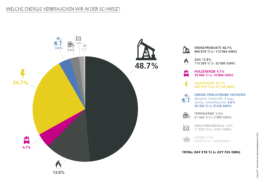Energy and water cost billing: consumption-dependent or not?
Usually once a year the residents of apartment buildings receive a utility bill, which shows the costs for energy and water, among other things. Most people will never have thought about how the total costs for energy and water within the property are shared among the residents - or probably only when they disagree with the bill. Where is the best place to turn when questions about utility bills arise? And what rules apply to these bills in the first place?
"The primary point of contact in the event of uncertainties in the service charge settlement is the administration of the property concerned," explains Patrik Lanter from the Swiss Association for Energy and Water Cost Settlement (SVW). The property management companies send the bills to the tenants or owners of the apartment building, but usually commission a specialised billing company to collect and process the data. These large accounting firms are united under the umbrella of the SVW. "Our task is to ensure that the property management companies share the water and energy costs for the individual residential units fairly," explains Patrik Lanter. However, they could not answer specific questions about higher energy and ancillary costs. "We come into play when someone has questions about the billing model or is dissatisfied with the distribution key," adds Lanter. The federal government is also waved aside: "We are not the point of contact for questions about service charge settlement," explains Adrian Grossenbacher, building specialist at the Federal Office of Energy. The fact that the SFOE regularly receives questions on the subject is due to the fact that the Confederation publishes the so-called VEWA, the model for consumption-dependent energy and water cost billing - also known as the federal model.
Because the settlement model and the distribution key are central to service charges, the federal government, cantons and SVW have published VEWA 2017. In 2018 it was supplemented by the section on mergers for own consumption and has recently been updated and republished (see box). For new buildings built in 2017 or later, the Confederation recommends that energy and water costs be invoiced according to the VEWA model. "Consumption in the individual dwellings depends heavily on the behaviour of the residents. It is therefore only fair if I only have to pay for the amount of energy and water actually consumed," explains Adrian Grossenbacher. VEWA also makes recommendations for the presentation of the bill so that it is easier for tenants and owners to understand: "A clear summary of the most important data and key figures is very helpful. The change in consumption compared to the previous year and the comparison with the residents of the other residential units can raise awareness of one's own consumption and even encourage savings efforts," explains Patrik Lanter.
In the view of the Federal Office of Energy, it is therefore desirable that VEWA be applied as widely as possible. "However, we cannot prescribe this to the cantons, which are responsible for the legal basis for energy and water cost billing," says Grossenbacher. The canton of Basel-Stadt, for example, is an exception today: in its energy ordinance it explicitly stipulates that the principles of VEWA must be observed for energy cost billing.
There are also major cantonal differences on another point: "Whether or not consumption-based billing is necessary at all depends on the size of the property," explains SVW President Patrik Lanter. Some cantons draw the line at three, others at five or even seven units. "These differences are difficult to understand because the costs for such settlements do not depend significantly on how many residential units they are made for," continues Lanter. The association would therefore welcome it if the cantons were to declare VEWA binding for properties with two or more residential units. As long as this is not yet the case, SVW is endeavouring on its own initiative to achieve standardisation: "The members of our association apply VEWA," he explains. This means that of the approximately 33 percent of apartment buildings that receive a consumption-based heating cost bill, about 80 percent would be made in accordance with VEWA's specifications.
So if you want to know whether the service charge settlement is calculated on the basis of consumption, it is best to check this with your administration.
New regulation for billing own consumption in VEWA
The billing of mergers for own consumption (ZEV) has been part of VEWA's activities since 2018. A ZEV makes it possible that electricity from the roof does not have to be fed into the grid for 4-6 centimes per kilowatt hour, but can be used by several consumers. Residents benefit from cheaper electricity, as the electricity produced locally is often cheaper than the electricity from the grid operator. Owners benefit from the amortization and interest through the sale of energy.
ZEV has been even more attractive since 2019. Previously, the own consumption tariff was only allowed to take into account a return within the scope of the ordinary reference interest rate. Depending on production costs and own consumption, the solar electricity tariff can then be around 16 cents/kWh, for example, while a standard electricity product from the grid operator can be around 20 cents/kWh, for example. In this example, the owner has a small return (current reference interest rate of 1.25%) and the occupant has a big benefit (solar electricity is over 30% cheaper than electricity from the grid). In order to create a balance and greater incentive for investment in photovoltaics, half of the margin between the owner's own electricity tariff and the standard electricity product may now be passed on to the consumer (profit share). In the above example, the initial tariff may be increased from 16 to 18 cents/kWh. This is still considerably cheaper than the grid tariff and offers the owner a greater investment incentive. The 4th edition of VEWA will be extended to include this regulation and will demonstrate its practical application in the billing model. It can be downloaded from the website of SwissEnergy or obtained free of charge from the shop of federal publications.
 Shutterstock
Shutterstock
 BFE - Brigitte MaderVersorgungssicherheit: BFE-Direktor Benoît Revaz im Swisspower-Interview
BFE - Brigitte MaderVersorgungssicherheit: BFE-Direktor Benoît Revaz im Swisspower-Interview  Martin Michel, BFEFreileitung oder Erdverkabelung? Nicht nur eine Kostenfrage
Martin Michel, BFEFreileitung oder Erdverkabelung? Nicht nur eine Kostenfrage  Luftwaffe SchweizVier Gesuche für Marktprämie für unrentable Wasserkraft
Luftwaffe SchweizVier Gesuche für Marktprämie für unrentable Wasserkraft  BFEFakten und Zahlen: Welche Energie verbrauchen wir in der Schweiz?
BFEFakten und Zahlen: Welche Energie verbrauchen wir in der Schweiz? 
 eicher+pauli
eicher+pauli Bundesamt für Energie
Bundesamt für Energie
Da kann man ewig darüber streiten, was verursachergerecht ist!
Die neue Regelung beim ZEV ist aber eindeutig zum Ungunsten der Mieter ..
Ob das die Energiewende vorantreiben wird, ist fraglich!